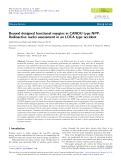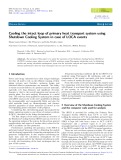
Heat Transport System
-
The radio nuclei present in the damaged fuel are supposed to be released into the main heat transport system and after that into the containment building in the worst case scenario. Assessing the radioactive nuclei maximum release is the purpose of the present paper.
 7p
7p  christabelhuynh
christabelhuynh
 31-05-2020
31-05-2020
 13
13
 2
2
 Download
Download
-
The purpose of this paper is to model the operation of the Shutdown Cooling System (SDCS) for CANDU 6 nuclear power plants in case of LOCA accidents, using Flowmaster calculation code, by delimiting models and setting calculation assumptions, input data for hydraulic analysis and input data for calculating thermal performance check for heat exchangers that are part of this system.
 7p
7p  christabelhuynh
christabelhuynh
 31-05-2020
31-05-2020
 22
22
 2
2
 Download
Download












